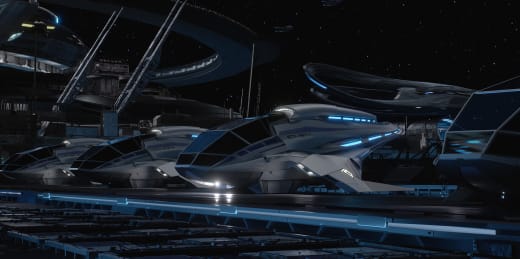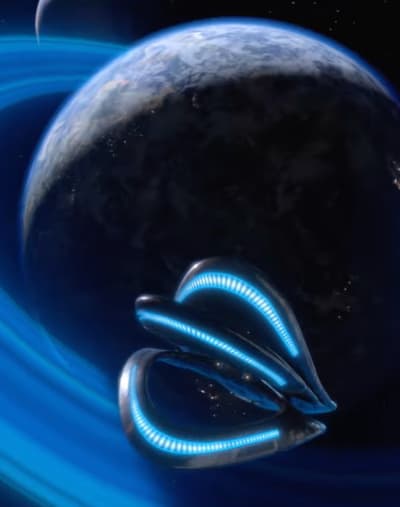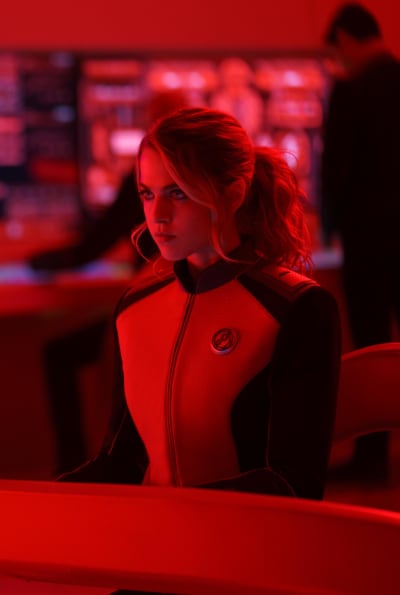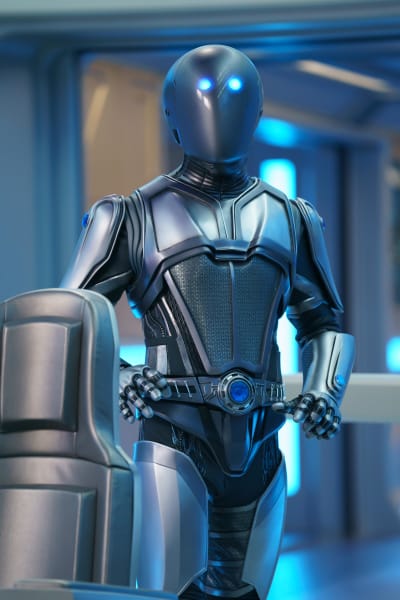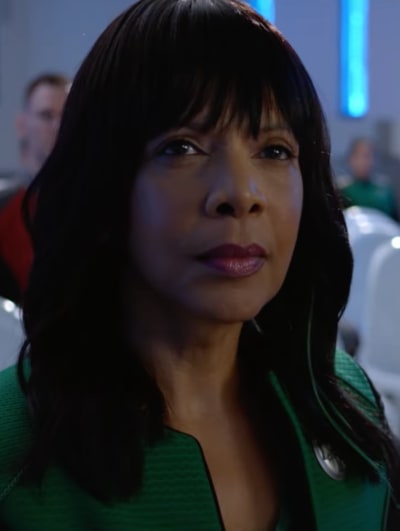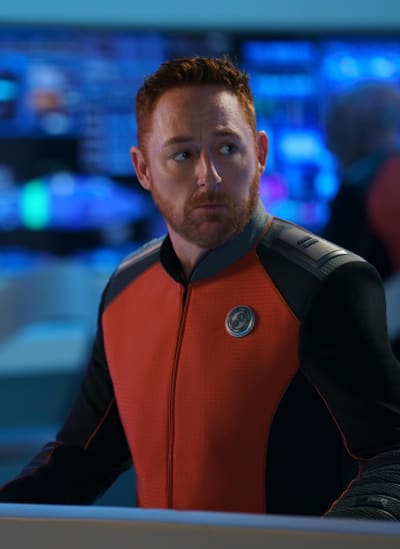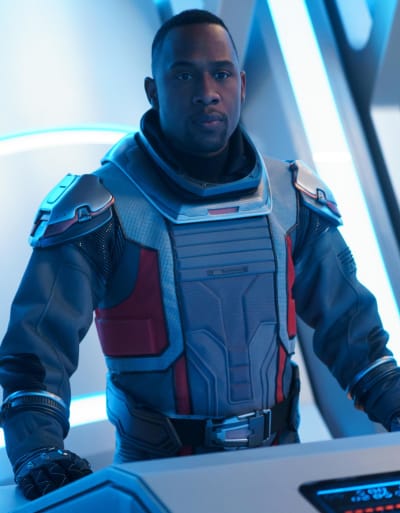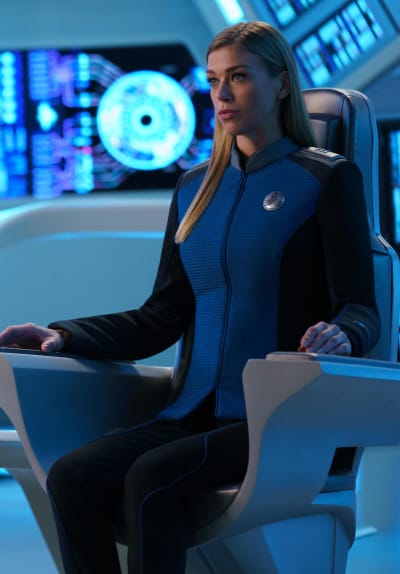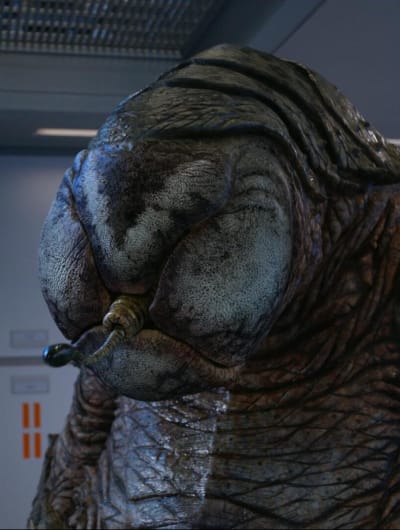It’s been over three years since we flew with Captain Mercer and his crew. In every way, The Orville: New Horizons Season 3 Episode 1 is Epic with a capital E, which is also an E for Electric Dreams, the premiere’s title.
Electric Dreams, of course, is a reference to the literary source material for the film Bladerunner, Philip K. Dick’s novel, Do Androids Dream of Electric Sheep?, but there’s another literary reference when you consider Isaac’s attempt to die in the light of Shakespeare and Hamlet’s description of suicide, “To sleep, perchance to dream.”
It’s a darker foray for a premiere than one might expect for Seth MacFarlane’s homage to Trek, given the humor and slapstick that set it apart from Star Trek: Discovery back in 2017 when both shows launched, but undeniably impressive in scope, style, and sentiment.
Kudos to the production team that pulled out all the stops to really show off what they’re able to do with a proper budget and a ridiculous amount of time.
This is a premiere that should be seen on a 3-D IMAX movie screen with as much immersive tech as you can throw at it.
From Malloy’s test drive of the Pterodon craft to the Orville’s submarine dive into the atmosphere of a storm-ridden planet, every maneuver and flight operation is clearly a passion project of a generation of space geeks who still dream of breaking the record on the Kessel Run.
Even the short series of effects that illustrate Isaac’s reactivation brings to mind the micro-machine magic of 1982’s Tron and 1987’s Innerspace.
In short, the space scenes are a visual feast deliberately designed to rev our quantum drives and fire our need for lightspeed—perfect 10s across the board from the judges.
It’s inside the ship where things get messy and complicated, and the writers should be lauded for respecting the aftermath of war with their take on the different faces of survivors’ trauma.
Unlike much of The Orville Season 1 and The Orville Season 2, where MacFarlane’s Mercer and Palicki’s Grayson often took center stage, the Season 3 premiere focuses on Earth’s only Kaylon ally, Isaac, and newcomer Ensign Charly Burke.
The genius of Isaac is that, as a Kaylon, he is an artificial life being who has absolutely no interest nor ability to attain human emotion.
That doesn’t stop the characters (or the audience, for that matter) from projecting emotional motivations onto his behavior, though.
Mercer’s eulogy even touches on that when he describes the different Isaacs different people grew to know. Or believed they knew.
Mercer: I had no idea things were this bad.
Talla: How could he get to this place? With no emotions.
Dr. Finn: I never believed that. We’re seeing just how much he really felt.
Dr. Finn is arguably the most invested crew member in Isaac having latent feelings in his matrix.
It’s fascinating to consider Isaac’s role in relation to each Finn family member.
Claire needs him to have feelings so that she can have her feelings reciprocated. Marcus wants him to have emotions so he can understand his trauma.
Only Ty has no demands on Isaac to have his own feelings. Ty accepts that Isaac doesn’t have the programming to be human. Ty simply needs Isaac to be there to receive Ty’s affection. One wonders if Ty wouldn’t have been able to heal his grief with the simulated Isaac hologram.
It really is a shame that you can’t feel anything. Because you deserve to feel all the pain in the universe.
Burke
Meanwhile, Burke wants him to have feelings so that he can suffer punishment on behalf of all Kaylons.
Her grief is understandable, as are the sentiments of the crew members, and it occurs to me that it might’ve been advisable for Mercer to allow crew members unhappy with serving alongside a Kaylon the option of transferring to another ship.
That would have put Malloy into a personal conflict as he admits to Burke that his sentiments align with hers.
He does seem a little taken aback by the depth of her commitment to fostering her hate, though.
Malloy: I don’t think Isaac should’ve been reinstated. Whether he was reactivated or not, he doesn’t belong on that bridge. Whenever I’m on duty, I feel like I have to force myself to actively ignore it.
Burke: I don’t think you should ignore it.
Malloy: There’s not much else to do.
Burke: Yeah, there is. You acknowledge that he’s there and you… stay angry.
Malloy: I guess I’m not that masochistic.
Burke: I mean, maybe one day we’ll wake up and he’ll be gone. In the meantime, I say embrace the masochism and… listen to the ghosts.
Until Marcus sat down with Burke, I felt like we were being sold a pretty two-dimensional character as the new season’s primary onboard antagonist.
Her decision to help bring Isaac back to free Marcus of his guilt changed that for me. I still struggle with her being as jaded and hate-driven as she’s painted, but her desire to help Marcus out plays out with authentic humanity.
It’s human instinct to look for someone or something to blame when this happens. Suicide is pointless. So we try to fill in the blanks. Even if it means betraying ourselves.
Burke
It would’ve been nice if she’d recognized her own self-blame mechanism regarding Amanda’s death in her words of advice to Marcus, but that would’ve been too easy a fix, I guess.
LaMarr and Irillia’s debate on the ethics of suicide in their post-coital afterglow is a curious way to switch on LaMarr’s mental lightbulb.
To be fair, he’s been working full-tilt three weeks straight on the refit. Not a lot of mental capacity for resurrecting an AI friend left over when the ship’s being overhauled.
Life isn’t appealing to everyone. Tastes vary. So, when someone decides to end theirs, we see it as a personal decision.
Irillia
And while I appreciate that multiple perspectives on death, suicide, and grieving are given air time, there are moments when the messaging feels deliberately muddied.
Rather than accepting that all perspectives are valid, there’s some harshness in instances like LaMarr’s judgment on suicide or Mercer’s take on grief.
Isaac’s presence on the ship isn’t going to stop being a problem anytime soon. How it shakes out with Burke and Malloy may mean even fewer laughs in the mess hall.
Overall, the premiere delivers a strong, visually stunning, complicated post-war narrative.
Mercer’s admission that he’s not sure about his decisions and Dr. Finn’s metaphor of being emotionally parched are spotlight moments of vulnerability in characters the ship depends on to be capable at all times.
Brave insights indicate self-awareness and a willingness to accept help and advice. Leaders are only made better through that acceptance.
(A brief sidenote: How bittersweet is it to hear the late Norm MacDonald voicing the scene-stealing Yaphit? I always hoped they’d establish a canonical lineage back to Ghostbusters’ Slimer one day.)
So is this still the Orville of fart jokes and bad dates? It could be, but all signs are that they’re shooting for something meatier with this new season. New horizons, as it were.
Do you think they’ll age up Marcus and Ty? After all, those boys have GROWN.
What are your thoughts, Fanatics? Was it worth waiting three years to see how this crew is doing? Hit our comments with your first impressions!
Diana Keng is a staff writer for TV Fanatic. Follow her on Twitter.


